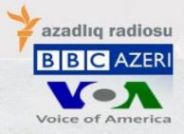The Azerbaijani government continued its clampdown on independent media outlets on Friday by declaring that Radio Liberty, Voice of America and BBC radios will be blocked from broadcasting by 2009 in order “to be consistent with European and international standards”.
“All foreign radio stations operating in Azerbaijan will be deprived of the frequencies which they are broadcast on, at the end of this year,” said the chairman of National Television and Radio Council (NTRBC).
Only voice for dissent
Dissenting voices and alternative information in Azerbaijan are only heard Radio Liberty (in Azerbaijani), Voice of America (in Azerbaijani and English) broadcast at 101.7 FM and BBC (in Azerbaijani, Russian and English) at 103.3 FM. These stations offer a rare opportunity for local audiences to air their views uncensored and help bridge divisions between pro-government and pro-opposition press.
Apart from these Western radio stations, almost all electronic media is reluctant to report on controversial issues and criticise top bureaucrats, fearing official retribution, including the revocation of broadcast licenses, repeated tax audits or tax evasion charges. The channels appear to favour the incumbent’s positions and often provide limited airtime for alternative viewpoints.
Although all these channels have their own frequency, last week’s controversial decision will enable their broadcasting to only be possible at local radios’ frequencies.
“These radio stations can further broadcast their programmes in Azerbaijan through satellite, cable network and internet”, the NTRBC chairman said. However, local media watchdog IRFS say the cable broadcasting does not “practically exist”, while the internet remains under government monopoly.
Reporters San Frontiers (RSF), in its recently publicised 2008 World Press Freedom Index covering 173 nations, saw Azerbaijan falling from 139th to 150th spot in the rankings.
Disturbing trend
Freedom of expression has been an increasing source of concern during last years. The U.S. Broadcasting Board of Governors (BBG) objected to last week’s decision saying it follows a “disturbing pattern” which started with harsh restrictions on private broadcasters within the country two years ago and now directly impacts on international media.
Television and radio remain the main sources of information for some 90 per cent of the population; however, all the broadcasting is under the full control of the government and owned by allies of the ruling Aliyev family. The incumbent regime effectively obstructs investigative journalism, prevents public debate and stifles open criticism of the government.
“We did not stop the broadcast of foreign radio stations before the presidential elections of 15 October, because this could be interpreted as the violation of freedom of speech during the election campaign,” said NTRBC chairman. However, the recent pre-election media monitoring by RSF concluded that the content of all the national TV and radio stations’ news broadcasts was “extremely biased and overwhelmingly pro-governmental”.
Public TV and radio, launched in 2005 under pressure from the Council of Europe, failed to break the state control to promote pluralism, as its board was staffed with pro-governmental officials, who ensured the station fell under the total influence of the ruling regime.
Controversial NTRBC
The Azerbaijani government controls the issuing of radio and television broadcast licenses through the NTRBC — made up of nine members all appointed by the President. Independent media analysts in Baku argue that government authorities essentially created the NTRBC in 2003 to control broadcast media by selectively issuing licenses. Azerbaijan ‘s most popular local broadcaster ANS TV was shut down in 2006 when NTRBC refused to extend its license. ANS TV and Radio has also been at the centre of a dispute over the re-broadcasting of news programmes from VoA and BBC in 2006.
NTRBC is blamed for being under the total control of political authorities, who want to restrict the influence of western media and isolate the country from the rest of the world.
Media observers in Baku say the NRTBC’s decision is politically-motivated and as part of a broad government effort to restrict access to alternative information. “Halting these [radio] channels has nothing to do with the legal regulation motive. It is purely a politically-motivated decision rather than a legal one”, says media expert Zeynal Mammadli.
“The closure of these radios will put a lid on already weakening freedom of expression and completely stifle on alternative information sources” commented local human rights activist, Fuad Hasanov.





